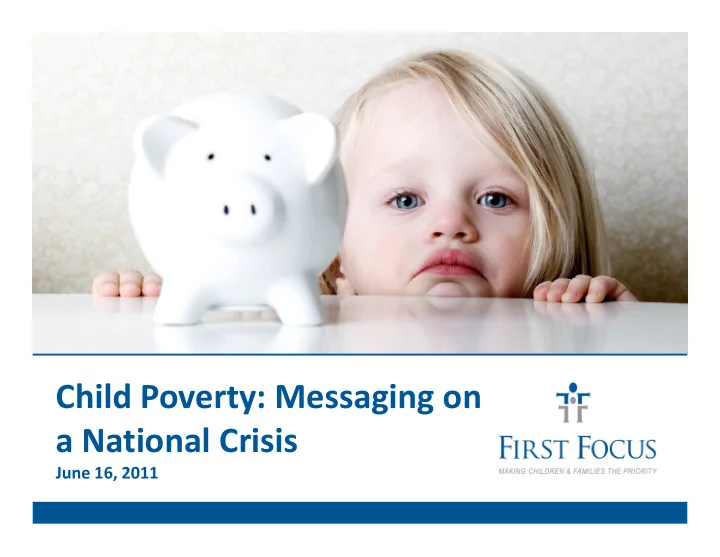

Child Poverty: Messaging on a National Crisis June 16, 2011
Figure 1: Absolute Poverty in the U.S. & U.K. 1989 – 2009 35 30 U.K. 25 20 Percent U.S. 15 10 5 0 1989 1990 1991 1992 1993 1994 1995 1996 1997 1998 1999 2000 2001 2002 2003 2004 2005 2006 2007 2008 2009 Year U.S.: Percent all persons under 18 years below official US Poverty Line, 1989-2009 (about 35 percent of median income in 2000) U.K.: Percent of U.K. children below the absolute poverty threshold, 1989-2008 (about 60 percent of median income in 1998-99) Smeeding & Waldfogel, 2010 Source : U.S. Census Bureau (2010): U.K. Department of Work and Pensions (2010): HBAI, 81.
Voters Believe America’s Kids Fare Poorly Thinking about the last 10 years, would you say that the lives of children in America have gotten better, Thinking about the last 10 years, would you say that the lives of children in America have gotten better, gotten worse, or no change? gotten worse, or no change? Worse (Somewhat worse/Much Worse) 58% Better (Somewhat Better/Much Better) 19% No Change
Kids’ Programs are Voters’ Priority K-12 Education 61% 27% 10% Child Nutrition Programs 54% 34% 12% CHIP 51% 37% 11% Medicaid 49% 40% 10% Medicare 49% 41% 9% Head Start Head Start 48% 48% 37% 37% 14% 14% Student Loans/Pell Grants 43% 41% 16% Unemploymenet Insurance 35% 42% 22% Medical & Scientific Research 33% 51% 16% National Defense 33% 46% 21% Job-Training Programs 28% 52% 19% Transportation Funding 22% 49% 28% No Reduction Minor Reduction Major Reduction
Voters Protect Medicaid The House budget proposal cuts over $750 billion from funding for Medicaid , a federal health program that provides care to low-income children, the elderly, and the disabled. Generally speaking, do you favor or oppose this cut. Oppose (Somewhat Oppose/Strongly Oppose) 70% Favor (Somewhat Favor/Strongly Favor) 27% Don’t Know/Refused
Voters Protect CHIP The House budget proposal cuts spending for the Children’s Health Insurance Program , a federal health program for low-income children whose families do not qualify for Medicaid. The budget proposal creates a $150 billion shortfall and could threaten the health care coverage for more than 7 million children. Generally speaking, do you favor or oppose this cut to CHIP. Oppose (Somewhat Oppose/Strongly Oppose) 73% Favor (Somewhat Favor/Strongly Favor) 23% Don’t Know/Refused
Cutting Programs is Not the Only Option Acceptable Unacceptable Ending Subsidies for Oil Companies Eliminating the Bush tax cuts for families tax cuts for families earning over 250,000 earning over 250,000 a year, requiring those families to pay more Eliminating corporate tax loopholes and federal subsidies to corporations
Cutting Programs is Not the Only Option When it comes to dealing with the federal government deficit, which approach would you prefer? Raising taxes on those earning over one million dollars Cutting important programs programs Both Neither Don’t know/ Refused
Children: Top Priority Among U.S. Voters The American people also choose to make children a priority over other issues on over other issues on a head-to-head basis.
Children: Best Messages Vary by Race/Ethnicity Best Messages (Back On Kids) The deficit is a national crisis and it is critical to the future of our country to get the deficit under control, but it is wrong to balance the budget on the backs of children. Children cannot vote and do not make campaign donations to politicians. Politicians choose to protect corporate donors from cuts that might affect their choose to protect corporate donors from cuts that might affect their bottom line. It is up to us to stand up for our kids. (Invest in the Future) These cuts may save us some money in the near-term, but in the long-term, they make no sense and will end up costing us more money. By investing in our kids now, we produce much more productive adults later. In fact, studies show that for every dollar invested in our kids, the government will get back a 7- 10% return on this investment…due to kids going to college, leading healthier lives and avoiding prison.
Children in the Budget Kids’ Share : Spending Trends
Create Agenda: CHIP – It Works Percentage of Children Without Health Insurance, By Poverty Level, 1998-2009 ��� ��������� ������ ��������������� ��� ��� ��� ��������� ������ �� �� �� ��������������� ���� ���� ���� ���� ���� ���� ���� ���� ���� ���� ���� ���� ����
�������������������������� ���������������������� Mean Percent preferring Percent preferring Margin Rating progressive opposition Opposition message 60.1 American Leadership 77.5 64 30 +34 Investment Investment 78.8 78.8 63 63 31 31 +32 +32 Back to Basics 79.6 62 32 +30 American Dream 77.2 60 33 +27 Greatest Generation 75.4 56 38 +18 American Challenge 72.7 55 40 +15
�������������������������� ���������� �������������������������������������������������������� ��������������������������������� ������������������� �������������������!����"���������������������������� �������� ����������������������������������������������� ����������������������� ������������������������������� 82 ������������������������������������������������������������� ���������������������������������������������������������������� ������������������������������������������������������������� ������ ������������������������������������������������� ������ ������������������������������������������������� ����������������������������������������������������������� ������������������������������������������������������������ ����������������������������������������������������������� ����������������������������������������������������������� �������������������������������������������������������������� ������������������������������������������������������������� ������������������������������������������������������� ������������������������������������������������������������ ������������������ ��������������������������������������������� �������������������������������������������������������� ����� ���������� 14
Recommend
More recommend